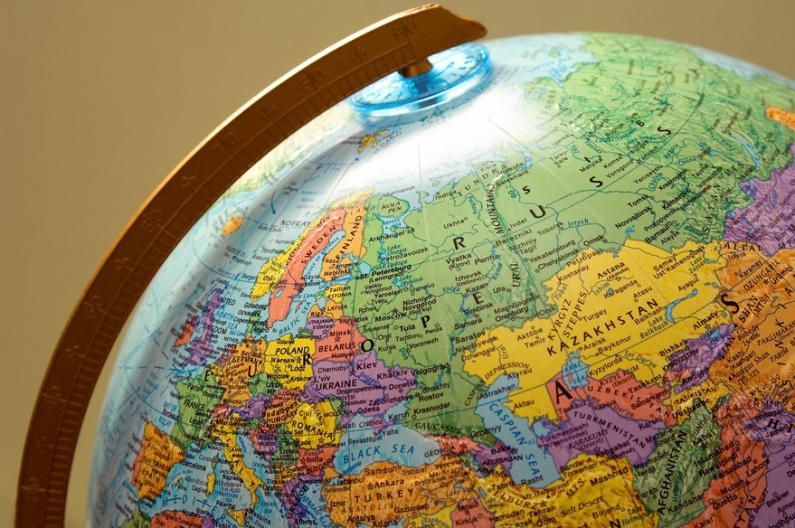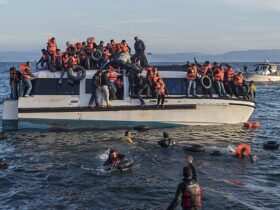The limbo between eastern and western alignment creates a violent and dangerous future for Central European states. The Visegràd Group (V4), a political and cultural alliance formed by Poland, Czech Republic, Hungary and Slovakia, has to reassess its political landscape and identity. The progressive path it had been on is being severely challenged by the reminiscing and resurging nationalistic propaganda, tying the bloc closer to its previous allegiance, Russia.
Emerging from a shared socialist past, the coalition served to align these nations toward European Union integration, gaining accession to the organization in 2004. The four nations enjoy the free flow of capital, goods, services, and people throughout the EU. Yet, the EU also prides itself on shared democratic norms, expecting its members to uphold these values in return for membership and common economic and political cooperation. In recent years, the Visegràd group has acted in discordance with the EU, reminiscing repressive ideals from the former Soviet bloc and deviating strongly from Brussels’ action plan.
Accession to the EU promised the V4 inclusion to the world’s largest common market. The labor market situation has improved in all four countries since the start of their EU membership. Poland for example, has received $154 billion from the EU since its accession, more than any other member country. This economic boost helped Poland make massive leaps in infrastructure. The aid, in combination with a higher standard of living, also enabled Poland to retain more of its working population within the country, counterbalancing the outflow caused by joining the EU.
The EU’s eastern members are also subject to paramount foreign direct investment (FDI) from the economic bloc. The inward FDI stock, a value of foreign investors’ equity and net loans to enterprises, accounts for over 40% of the GDP for each of the four Visegràd countries. Proportions of this order exhibit how strongly the V4’s economies rely on the close partnership with the EU and its western affiliates.
The V4 are also the main topic of interest of the EU’s cohesion policy, an aim by the institution to reduce disparities, improve employment, and support convergence of incomes across its member states. During EU budget distribution from 2007 to 2013, the V4 received half of the total cohesion funding. Such funds unlock large scale infrastructure investments, bringing about economic growth and prosperity. In compliance with this, the Visegràd states were, collectively, Germany’s most important trading partner in 2017 due to their inclusion into European supply chains.
EU membership clearly brings economic development as well as social inclusion to the states left fragile by the demise of the former Soviet Union. Yet, all four countries continuously prove that their belonging to the European common market does not guarantee compliance with any problem-solving or political alignment. Analyzing these acts of non-compliance shows the former socialist identity is still very much embedded in the region, as the V4 are very attached to their nationalistic and authoritarian beliefs.
The most prominent example of disobedience is the migrant crisis of 2015. The European Court of Justice found that Poland, Hungary, and the Czech Republic had breached EU law by taking little to no migrants during the crisis. The EU policy called upon member states to properly manage migration flows, sharing the burden and imposing redistribution quotas.
The three nations disagreed with key EU policy, stating that supporting migration brings more problems to the EU. This lack of burden sharing was met with heavy criticism by other European leaders, leaving countries such as Germany to take in over one million asylum seekers between 2015 and 2016 alone. The anti-immigrant stance also falls in line with the V4’s nationalistic belief in homogeneity, wanting to keep the majority of their population of the same religion, ethnicity, and race.
The Center for European Studies links this lack of burden sharing to the fact that the V4 states had little authority over their borders during the Soviet Union. The stream from East to West left these countries very fragile in the past. A reminiscence of internal and physical division is a harrowing narrative for these countries. However, the group cannot support open EU borders when it benefits from the inflow of remittances and FDI, to then decline the flow of movement when a problem arises.
If the V4 felt that the EU was solely bringing economic development to their countries, would they still nitpick what part of the membership they agree with? Hard to believe. This is why the V4’s viewpoint needs to be considered. In fact, the aforementioned emigration to Western Europe meant that many high-skilled labor forces left their countries. Moreover, the levels of FDI in the Central European countries have bought out the local market. The Visegràd nations cannot establish their own economic landscape as they are now dependent on Western capital.
By not developing their own economic sovereignty, the V4 know that they will never be considered heavyweights within the EU spectrum. As outlined by a lecturer at the Institute of European Studies, the V4 feel inferior to other member countries, essentially being handed out a second-class membership. If not valued as an economic partner, the Visegrad states are in no rush to adapt their political landscape to the rest of Europe. Instead of a successful EU integration narrative, their new narrative is that they are an underappreciated bunch.
Despite being tied to the West, the V4 don’t want to be bullied into an adaptation of policies such as migrant intake strictly because someone much further West in Brussels says so, a view shared by a Visegrad minister. Instead, many parts of the four countries are driving forward political sovereignty from the EU, pushing further right. And while this viewpoint is not widespread throughout all four countries, it helps to explain their rebellious behavior in terms of foreign policy.
The V4 has also observed how Brexit has left the EU fragile. Viktor Orban, Hungary’s prime minister and perhaps the strongest euroskeptic of the V4, attacks the EU’s weaknesses by stating it “is unable to protect its own citizens, to protect its external borders and to keep the community together, as Britain has just left.” Following the strongest anti-EU sentiments in the region suggests the V4 has identified the instability of the EU. Thus, if it is to stay in the EU, it will not tolerate being treated as a young member within the organization.
The Visegràd group uses that knowledge to its advantage. If these countries do not feel valued as an EU partner, they will not limit the spreading of far right and repressive politics in their countries. In fact, due to the notion of lost sovereignty across their states, they are holding onto their discriminative and nationalistic beliefs even more. These beliefs never truly disappeared with the fall of the Soviet era. If anything, the migrant crisis as well as the perceived disrespect from Brussels has poured fuel on the V4’s non-political alignment with the West.
A more recent example perfectly illustrates the level the repression has reached. Poland and Hungary rejected COVID-19 stimulus funds created by the EU in 2020, explaining that the countries don’t see eye to eye with the rest of the EU on topics such as migration and gender. Allowing the stimulus funds would enable EU countries to force their interpretation on these topics on Poland and Hungary. Instead of easing the effects of the pandemic on its citizens, the two nations would rather block much needed recovery funds, due to the possible implications this could have on migration and gender rights in their nations.
The mayors of capital cities Warsaw and Budapest were in disbelief by this action. In a joint statement, they sharply criticized their own governments, accusing them of spreading non-liberal ideologies and corrupt interests. Clearly, we can observe a strong divide between the countries’ leaders’, and their capital cities, which are exposed to a richer cultural blend. This divide in itself portrays the stubborn nature of the governments, unable to adapt to changing norms in its own country, and stuck in denial toward cultural diversity and liberalism.
While this is the strongest case of the V4 disregarding EU morals, the far right and repressive ideologies are strong and growing across all four Visegràd states. The fingers are often pointed at Poland and Hungary, and with good reason, but Slovakia and Czech Republic exhibit those same ideologies.
Slovakia has had the most successful rise of a radical far-right in politics. The opposition party to the government has gotten daunting levels of support. The People’s Party Our Slovakia (LSNS) presents itself as a respectable party, yet its extremist affiliations can be discerned very easily. From celebrating anniversaries of fascist war heroes, to putting up billboards condemning LGBT and migrant communities, repressive and undemocratic politics have clearly resurfaced in Slovakia.
An even stronger trend is noted in the Czech Republic, as it isn’t the opposition party but the governing party exhibiting undemocratic politics. Czechian Prime Minister Andrej Babiš has distributed EU funds in an incorrect and corrupt way, giving the money to his own conglomerate instead of the small to medium sized enterprises the funds were meant for. This resulted in convictions by the European Commission. If that wasn’t enough, Czech President Milos Zeman is openly racist, xenophobic, and frequently showcases much stronger alignment with Russian Ideals than European ones.
Real communist power is on the rise once again across the V4. This is not to say that the trend hasn’t occurred across other EU members, but the Visegràd states are specifically placing nationalistic anti-immigrant culture above all else. The EU does not seem to be wholly respected and previous ties with the Kremlin’s ideologies are entertained. As a result, the EU does not give the V4 as much decision making power in Brussels.
The Visegràd coalition thrived to be part of an economically prosperous and forward-looking Europe, yet strongly disrespects the European identity. At times it seems the countries themselves don’t know what they want to belong to. The identity crisis needs to be resolved, as Europe has worked toward peace for too long to revert back.
How do you solve an identity crisis? By forming an identity. The V4 have relied heavily on EU funds and remittances to promote their economic agenda, but they haven’t identified their own niches in production since joining the EU. The EU needs to encourage this and let industries flourish without intervention. Otherwise, the European market will never truly value the V4, they will continue to treat them as second-class members and in return the V4 will act nefariously toward the organization, creating a vicious loop.
On the EU side, it should offer incentives to the V4. If they adapt their political agenda more to that of the West, they can carry more voice in Brussels. As of now the V4 do not see a reason why they shouldn’t enforce their oppressive beliefs in homogeneity, they need to see a benefit in altering the way their politics is run.
A softer solution in the meantime could be resolutions that resemble the “pact of free cities.” Particularly, the culturally diverse metropoles of the Visegràd states strongly disagree with the oppressive actions of their own governments. If corruption and repression from their own governments prevents them from aligning themselves with the rest of the EU, they should not be punished. A separate relationship should be built between the EU and the cities.







